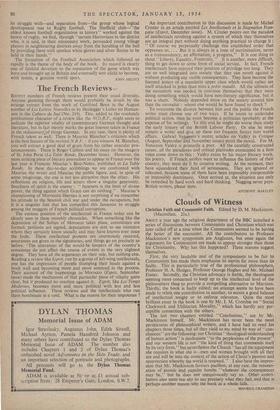The French Reviews--
RECENT numbers of French reviews present their usual diversity. Anyone glancing through them would probably be struck by the strange extract from the work of Gottfried Berm in the August number of Les Lettres Nouvelles or by Heidegger's Letter on Human- ism in the Cahiers du Sud (No. 319). This, added to the resolutely posthumous character of a review like the N(2).R.F., might seem to indicate the superior vitality of contemporary German thought and literature, but in fact merely marks the great interest taken in France in the rediscovery:of things German. In any case, there is plenty of French talent as well. There is Maurice Blanchot's criticism which is the best feature of the revived N.R.F. : if you winnow M. Blanchot, you will extract a good deal of grain from his rather oracular pro- nouncements. There is Roger Caillois and his essay on the imagery of St. John Perse (La Table Ronde, December issue). However, the most striking piece of literary journalism to appear in France over the last year is Francois Mauriac's Bloc-Notes, published in La Table Ronde. In these day-to-day scribblings we are confronted with Mauriac the writer and Mauriac the public figure, and, in spite of some misgivings, the one is not less attractive than the other. His reflections on religion, life and letters show a singular generosity. Smallness of spirit is the enemy : " baseness is the limit of divine power, the thing against which Grace can do nothing." Mauriac's championing of Moroccan liberties is not surprising if we remember his attitude to the Spanish civil war and under the occupation, but it is a singular fate that has compelled this Jansenist to struggle among the maggots of French political corruption.
The curious position of the intellectual in France today can be clearly seen in these monthly chronicles. When something like the deposition of the Sultan of Morocco takes place, committees are formed, petitions are signed, deputations are sent to see ministers whom they certainly know socially and may have known ever since the lyc6e. These intellectual protests are courteously received, assurances are given to the signatories, and things go on precisely as before. •The utterances of the would-be keepers of the country's conscience do not affect the course of events in the very slightest degree. They have all the arguments on their side, but nothing else. Reading a review like Esprit, run by a group of left-wing intellectuals, one has the impression of people thumping their heads against a brick wall and becoming more and more annoyed in the process. Their account of the happenings in Morocco (Esprit, September issue) made the mechanism of that particular piece of villainy quite clear, but it produced no reaction against it. Esprit, like Les Temps Modernes, becomes more and more political with less and less political influence. These reviews and the intellectuals who run them bombinate in a void. What is the reason for their impotence ? An important contribution to this discussion is made by Michel Crozier in an article entitled Les Intellectuels et la Stagnation Fran- gaise (Esprit, December issue). M. Crozier points out the paradox of intellectuals revolting against a system of which they themselves are an integral part without doing anything practical to change it : " Of course we perpetually challenge this established order that oppresses us.... But it is always in a tone of recrimination, never as a transcendancy, an affirmation, a progress." It is one thing to shout "Liberty, Equality, Fraternity." It is another, more difficult, thing to get down to some form of social service. In fact; French intellectuals have enjoyed their position of privilege too long. They are so well integrated into society_ that they can revolt against it without producing any visible consequences. They have become the licensed jesters of a mandarin upper class which 'would rather see itself attacked in print than miss a poete maudit. All the silliness of the surrealists was needed to convince themselves that they were doing something which would have non-literary significance, but it was a sham. Nobody depended more on the society around him than the surrealist : whom else would he have found to shock ?
To overcome the divorce between him and the public the French writer must choose one of two ways. If he wants to undertake political action, then he must become a politician (probably at the expense of his writing). To this end he might do worse than study the early history of the British Labour Party. Or else he must remain a writer and give up these too frequent forays' into world affairs. Gabriel Venaissin's recent articles on Valery in Critique (August, September and November issues) point the moral. For M. Venaissin Valery is primarily a poet. All the carefully constructed career, all the paradoxes and critical platitudes enunciated in a firm voice come down to this : Val6ry exists by his major literary work, his poetry. If French writers want to influence the history of their country, they must do it by creative writing. At the moment, they have squandered their fund of seriousness. They are ignored or tolerated, because some of them have been impossibly irresponsible or impossibly doctrinaire. Once arrived at, the situation can only be remedied by hard work and hard thinking. ' Nagging never pays. British writers, please note.
ANTHONY HARTLEY


































 Previous page
Previous page